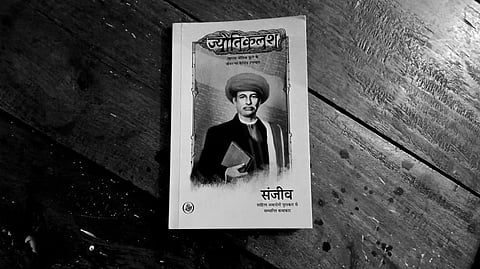
In the history of India, few figures stand out as courageously and selflessly committed to the cause of the oppressed as Mahatma Jyotiba Phule. One early incident from his childhood left such a deep scar on his conscience that it sparked a lifelong struggle against casteism, Brahminism, superstition, and social hypocrisy.
This formative event is powerfully depicted in the book ‘Jyoti Kalash’, written by renowned Hindi author Sanjeev — editor of the iconic magazine Hans, a columnist, and recipient of the Sahitya Akademi Award. Published by Rajkamal Prakashan, the book serves as a chronological documentation of real-life events from Phule's life. In its very first chapter, Sanjeev recounts the incident that led young Jyotiba to become fiercely committed to the cause of Dalits and backward communities.
According to the book, Jyotiba receives a wedding invitation from his classmate, Paranjpe. The note ends with an affectionate threat: "If you don’t come, our friendship is over." Excited, young Jyotiba begins to prepare himself for the grand wedding procession.
Seeing his son dressed up, his father Govindrao asks, “Where are you going?”
“To Paranjpe’s wedding procession,” Jyotiba replies cheerfully.
Govindrao is reminded of bitter experiences of humiliation in Brahmin weddings in the past. The memories sting like thorns. Still, not wanting to dampen his son's spirit, he says nothing.
The wedding procession is in full swing, with drums, music, and fireworks. Paranjpe, the groom, is dressed regally and seated in a decorated chariot alongside his younger brother. Amidst the festive chaos, there’s a problem — the man in charge of setting off the ceremonial fireworks, Patil, is missing. People murmur anxiously, wondering who will light the fireworks now.
When the boys are asked if anyone can do it, most express fear. But Jyotiba steps forward and says, “I’m not afraid.” He picks up the firework launcher and begins firing celebratory shots into the sky, leading the procession.
Just then, a heavily adorned Brahmin man — wearing a tripund (sacred ash mark) on his forehead and a traditional turban — steps forward and stops Jyotiba.
“You…?” the man sneers. “Aren’t you the son of Govindrao Ghonhe?”
“Yes,” Jyotiba replies.
With visible disdain, the Brahmin thunders, “How dare you join a Brahmin wedding procession?”
“I was invited,” Jyotiba responds.
“Invited, huh? What Paranjpe did was wrong, but you — how could you forget that you’re a Shudra? And this is a Brahmin wedding. Have you lost your mind? Since when did you become equal to Brahmins?”
A more compassionate Brahmin steps in and tries to pacify the situation. “Let it go — he’s just a boy. He was invited by his friend. He even handled the fireworks.”
“Let him stay — but only at the back,” the turbaned man declares. “With the Ramoshis and the baggage carriers.”
Humiliated, Jyotiba moves to the back of the procession. A Ramoshi — a man from a lower caste — standing nearby approaches him and says, “Thrown out by the Brahmins, huh? What were you thinking? Did you forget how Brahmins treat Shudras and untouchables? Go home, child! The garlands aren’t for you. The music isn’t for you. The lights, the celebration — none of it is for you. You’re a Shudra. Thrown out, just like always.”
Heartbroken, Jyotiba returns home. His father notices his downcast face. “What happened? Didn’t you go?”
Jyotiba narrates the whole humiliating incident. His father listens in silence, watching his son's darkened face. Memories of his own past humiliation come flooding back. “I wanted to stop you,” he finally says. “But I stayed quiet, fearing it would break your spirit.” After a pause, he adds, “They didn’t beat you, didn’t punish you — isn’t that mercy enough? You were wrong to go.”
Tears well up in Jyotiba’s eyes. Govindrao consoles him: “No, son. We can never be equal to them. They are Brahmins, and we — we are Shudras.”
A broken Jyotiba is still reeling from the incident when the Ramoshi appears again and says bitterly, “Why did you even go? I never go. It’s our fate — they were born Brahmins, you a Shudra, I a Ramoshi. What can we do?”
That night passed slowly and painfully. For Jyotiba Phule, it was perhaps the first personal brush with caste-based humiliation — one that deeply shook his soul and awakened in him a resolve to challenge the unjust social order.
In ‘Jyoti Kalash’, Sanjeev documents many such untold and poignant moments from Mahatma Jyotiba Phule’s life — stories he lived, witnessed, and bravely fought against. The book brings to life the emotional, social, and ideological evolution of one of India's greatest social reformers.
You can also join our WhatsApp group to get premium and selected news of The Mooknayak on WhatsApp. Click here to join the WhatsApp group.